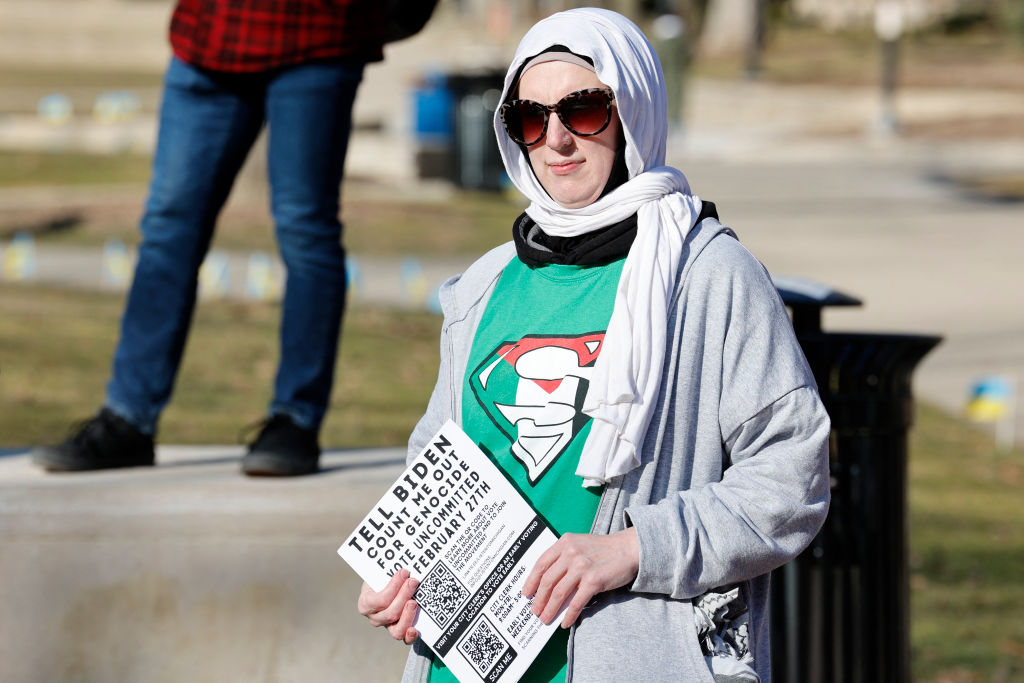On the first actuality of a body having womanhood potentially.
Mean Girls Rising

Democrats are increasingly beholden to leftist radicals in their midst.
Once the putative party of the people, the Democrats are increasingly the party of political “Mean Girls.” Epitomized by the congressional “Squad,” radicalized women are driving the party ever further to the leftist fringe on issues such as embracing Hamas, apocalyptic climate policies, mass illegal immigration, and transgenderism.
Party organs including the New Republic and the New York Times hail these activists as the “future of the Democratic Party.” Unlike traditional Democrats who won over small business owners, members of industrial unions, and aspiring middle class minorities, the Mean Girls have broken with the New Deal tradition that united the party. Rather than appealing to the aspirations of families, in the new configuration it’s all about “the personal is political,” with lifestyle and sexual orientation as defining issues.
Conservatives of course have their off-key women like Laura Bobert and Marjorie Taylor Greem, but few consider them intellectual leaders or particularly feminist. In contrast, Irving Kristol a half century ago noted the “feminization of the Democratic Party,” a process accelerated by the decline in family formation, marriage, and child-rearing. Some outlets like Salon see the rise of women and the gender gap as providing the keys to obtaining unlimited progressive power. Although married women tend to vote Republican, albeit by a smaller margin than men, single women prefer the Democrats by a whopping 37 point margin, even as young men are shifting somewhat to the Right.
The American Enterprise Institute’s Sam Abrams notes that politically engaged women, particularly those at elite colleges, increasingly stand at the tip of the progressive spear. They are far more likely to support cancel culture than their male counterparts. Overall, the Left’s political Mean Girls follow an agenda shaped largely by feminists and gay activists
In its drive to appeal to these groups, and keep them from going off the rails, the Biden Administration has embraced sexual attitudes that are far removed from traditional norms. Secretary of State Antony Blinken may fail to address Russia, Hamas, or Iran but feels compelled to urge diplomats to eschew “sexist” words like “father.” The president himself has promoted transgenderism as the “civil rights issue of our time,” even issuing a proclamation that celebrated a “Transgender Day of Visibility” on Easter.
The radicalization of educated women also reflects a steady deterioration in gender relations. Women now collect nearly 60 percent of bachelor’s degrees. And they generally outnumber men in academia: 75 percent of Ivy League presidents, 66 percent of college administrators, and 58 percent of recent graduates are now female. Universities have become the primary generators of feminist and gay ideology. On college campuses, as author and longtime feminist Susan Jacoby notes, even the most sensitive and sympathetic men “have been robbed of their true nature and humanity.”
There’s clearly a mood of familial and gender confusion. Today over 28 percent of all young women, notes Gallup, identify as LGBTQ, more than twice the rate for Millennials and almost three times that for young men. Many gay activists have become predictably radicalized, not only about their lifestyle choice but about such matters as the anti-Israel movement, which is somewhat ironic since the Jewish State, whatever its flaws, remains the only safe place in the Middle East for sexual non-conformists, and women’s rights in general.
Some of this radicalism may reflect inner torment. In many areas such as self-harm and depression, teen girls generally suffer more than men according to psychologist Jonathan Haidt, while the percentage who have contemplated suicide has surged. Women now experience twice the levels of anxiety and depression than men. Analyst Aaron Renn notes that men feel oppressed by women, who dominate teaching, the universities, HR departments, and, “to add insult to injury, continue to insist that they are members of a protected class.”
Overall, as women rise, men seem to be falling. Today, according to demographer Nicholas Eberstadt, employment rates among men are at “Depression-era” levels. Almost one in five men aged 25 to 54 lack full-time work. This limits opportunities to establish stable families or even find decent partners. The Brookings Institution’s Richard Reeves has found that one-third of the decline in marriage rates is driven by the inability of women to find stable, smart, and successful partners. As many as one in four women will be childless for their entire lives in the near future according to analyst Lyman Stone. Many, he notes, will be approaching retirement age with no immediate family.
Some feminists may celebrate these trends, but it does not bode well necessarily for women in general. Married women in fact do far better professionally and economically, notes Brookings, than their single counterparts. The virtues of marriage are often dismissed but remain critical to better physical and mental health for women, according to a recent Harvard study. The current transgender fixation also can be seen as hurting women, such as by allowing clearly biological males to compete against them in sports, even in the face of protests by athletes and some prominent feminists.
Historically, pro-family policies were seen as progressive and pro-woman, helping families stay intact through subsidized daycare, parental leave, and free education. But now the progressive Left is increasingly indifferent, or even hostile, to the primacy of family. There’s a boom in “queer studies,” sometimes with an agenda to replace the nuclear family with some form of collectivized child-rearing. Groups like Black Lives Matter have made opposing the nuclear family a part of its platform, even though family breakdown has hurt African American boys most of all.
This might also not be the ideal political strategy. Outside of abortion, many progressive social views are driving away much of what should be the Democratic Party’s base, including immigrants, minorities, and working people. Despite the social changes of the past decade or two, most single people, including younger ones, are not anxious to jettison the traditional aspirations of family life.
In contrast, progressives are far less likely to be married, have children, or attend church—all traditional sources of comfort. In an era where “politics is personal,” marital status is a critical issue. Married people tend to have different priorities, accounting, for instance, for around three-quarters of all homeowners in the U.S.
Rather than carving out a piece of the American Dream for their spouses and offspring, progressives tend to support greater government in the form of things like rent subsidies or direct transfers. This is reflected in the pitch of former U.S. President Barack Obama’s “Life of Julia” and President Joe Biden’s “Life of Linda.” These policy cartoons are geared toward women who never marry, with the occasional child-rearing addressed not by family resources but government transfers.
The feminized progressive agenda also has a clear class component. Women have advanced in the professions, often at the top levels. To be sure, the long-standing pay gap between men and women still exists, but women are making progress toward the top echelon in the U.S. Women started a majority of all new firms in the U.S. in 2020 and 2021. Men still earn more, but among young adults aged 20 to 24, the income gap has narrowed to just $43 a week.
These professionals, increasingly Democratic in their orientation, include the party’s most effective cadre: teachers unions. As Richard Reeves has shown in a new research brief, men account for just 23 percent of U.S. public elementary and secondary school teachers (not including kindergarten), down from 30 percent in 1988. There are now more women working in STEM fields (26 percent female, up from 14 percent in 1980) than there are men working in school classrooms.
At both the secondary and college level, many women see themselves as what some like to call “scholar activists.” Consistent backers of progressive Democrats, teachers unions have become increasingly outspoken—including in front of their students—on issues such as Palestine and race, as well as keeping parents out of the loop for “transitioning” minors.
In contrast, men work in tactile professions—manufacturing and agriculture and particularly ranching, logistics, and home construction—most threatened by Green New Deal initiatives primarily promoted by the Squad. Not surprisingly, oil riggers, construction workers, pilots, and truck drivers tend to the Right while mostly female flight attendants, librarians, teachers, and yoga instructors veer Left.
This presents a challenge for the party, particularly with groups like Latinos who are particularly overrepresented in industries like trucking and logistics. Using American Community Survey data, Chapman University Business School professor Marshall Toplansky notes that Latinos account for more than two-fifths of the U.S. food production and forestry workforce, over a third of ground clearing and maintenance, and a quarter of workers in logistics and manufacturing. In states like California, they represent roughly 60 percent of all manufacturing and construction workers.
In addition, although they still to lean Left on economic issues, immigrants tend to be considerably more socially conservative than most native-born Americans. Minorities and immigrants have been prominent in parent protests about gender ideology in highly diverse places like Jackson Heights, Queens, and the Maryland suburbs, as well as in immigrant-rich communities like Glendale, California. Although they may not be the reliable social conservatives imagined by some Republicans, they favor restrictions on abortion by a 10-point margin over other ethnic groups.
Latinos and other immigrants also tend to be largely patriotic in their attitudes, while progressive youth have the least degree of attachment to the nation. Latinos boast some of the highest rates of voluntary enlistment and military service and represent the fastest growing population in the military, making up about 16 percent of all active-duty military. Mean Girls and their political allies often seem more concerned with how many gays or transgender people there are in the military than actually defending the country.
Mean Girl politics certainly does not stir minorities, notably African American men, who seem likely simply to eschew voting entirely. Young, particularly male, working-class voters, now heavily Latino, are tilting to the Right just as we see in Italy, Argentina, France, Sweden, Greece, Switzerland, and Spain.
What should the party do? John Judis and Ruy Teixeira note that Democrats need to deemphasize their climate obsession, open borders, and gender issues and focus instead on “the number one issue – high prices.” The biggest issues for Latinos, and most voters, are inflation and the economy, which are well ahead of climate change or concern with the future of democracy.
But to win back these voters, the Democrats need to take on the extremism of the Mean Girls. The good news is that there are signs of pushback. In some places this means traditional Democrats making strong primary challenges against the Squad and their acolytes. Some swing state Democrats, notably Pennsylvania Governor Josh Shapiro and Senator John Fetterman, have stood up to climate and pro-Hamas activists. Hopeful signs include new initiatives for parental rights, limits on taxes, and stronger law enforcement, which are all on the ballot in deep blue Washington State. This follows a nationwide rejection of defunding law enforcement, as well as the removal of lenient DAs and extreme school board members, even in such true blue havens as San Francisco.
As an old Democrat, I view such trends as hopeful signs of the chance to revive a more constructive and forward-looking party. Without strong support from immigrants, particularly Latinos, and some working-class whites, the Democrats will be hard pressed to secure a permanent majority. The Democrats may still win this year against the deeply flawed Donald Trump and by playing up the abortion issue. But on the broader economic and cultural fronts, the Mean Girl agenda seems a likely loser in the years ahead.
The American Mind presents a range of perspectives. Views are writers’ own and do not necessarily represent those of The Claremont Institute.
The American Mind is a publication of the Claremont Institute, a non-profit 501(c)(3) organization, dedicated to restoring the principles of the American Founding to their rightful, preeminent authority in our national life. Interested in supporting our work? Gifts to the Claremont Institute are tax-deductible.
The Left’s future leaves marriage and family in the past.
Some words of advice for Jim Banks's new anti-woke caucus.



